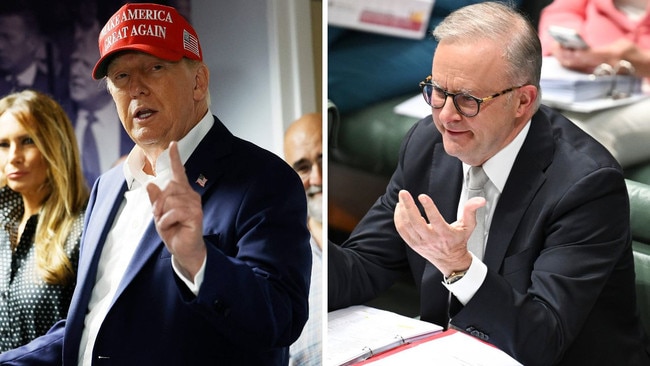Donald Trump’s swing could be a harbinger of doom for Anthony Albanese’s own re-election hopes


This is his worst nightmare. And for Labor and its re-election hopes, the concern will be whether Donald Trump’s apparent comeback presents a harbinger for its own doom.
The Prime Minister starts dangerously behind in a relationship considered to be Australia’s most important, boxed into a position of weakness with his 2017 private remarks about Trump now very much public.
This is a potential problem for Albanese at the outset. At some point, he and Trump will have to have a difficult conversation.
The policy consequences are obvious. Trump will likely pull out of the Paris climate change talks and rewrite the international narrative on an issue central to Labor’s energy and manufacturing policy platform. Albanese’s third pillar of climate change as a national security framework with the US, signed with Joe Biden, will almost certainly be ditched.
Treasury has also modelled the consequences of a Trump presidency, considering downside risks to Australia being a second-round victim of the trade disruption Trump is threatening.
The fundamentals are unlikely to change. AUKUS will be safe, the Quad will remain and the strategic issues in the Indo-Pacific will continue to be a primary US focus.
The US result will also send a sobering message to Labor strategists. Trump was the beneficiary, at a deeper level, of yet another example of traditional left-leaning working-class voters jumping ship.
This isn’t a phenomenon confined to the US. Voter concerns over the economy were paramount, as they are here. There are Labor-held metropolitan seats vulnerable to the same breakout of discontent built on a campaign that borrowed the 1984 Raegan slogan that asked voters if they felt better off than they were four years ago. No, was the resounding answer.
Kamala Harris had no economic narrative and refused to engage on it. Many US voters believed that the economy had done well under Trump before.
Younger voters also proved that they aren’t locked in while the Democrats wrongly assumed all women voted the same way. Crime and border control were key issues, with many women in the US swinging behind Trump because of their fear of rising crime. It proves just how potent these issues are, and they are mirrored to some extent in Australia.
The result was also a warning sign that a negative campaign built around the character assassination of an opponent doesn’t always work.
Conservatives will be quick to assume the Trump victory more broadly was a rejection of wokism. There is evidence of this, with implications for the Australian domestic context.
Albanese’s immediate challenge will be to keep his troops in line in their reaction to Trump while working out a new strategy to deal with the Greens who will seek to wedge the Prime Minister over the alliance. Albanese in parliament was right when he said the election of a US president had profound consequences for the world and for Australia.
Trump’s election requires a depth of maturity from the Albanese cabinet that it hasn’t always displayed to date.





Hold on to your hats. Its going to be another wild ride. But for Anthony Albanese, it is going to be an especially difficult one.